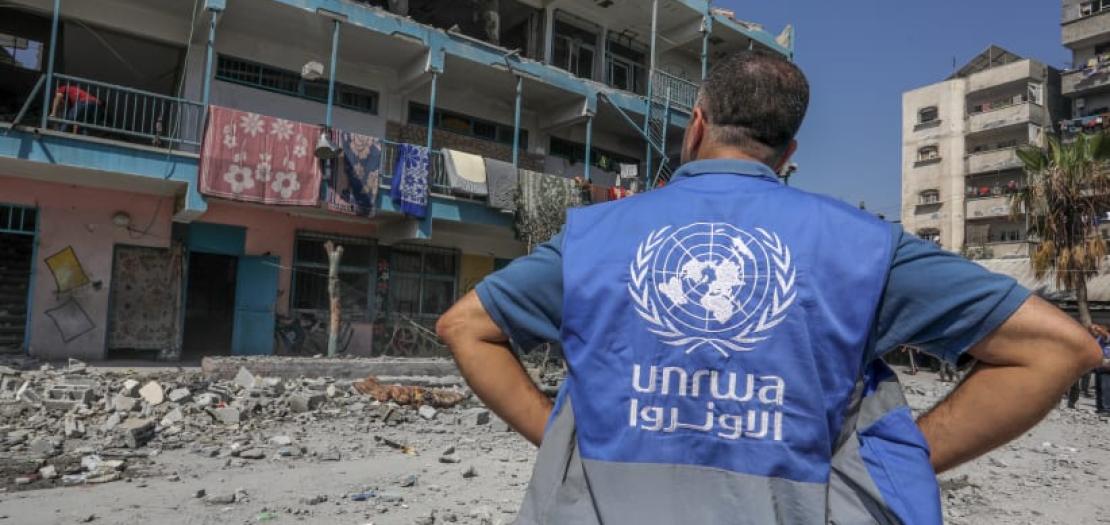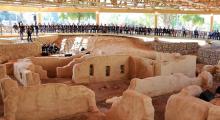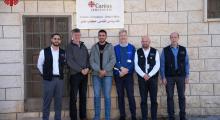Issued by the Catholic Center for Studies and Media - Jordan. Editor-in-chief Fr. Rif'at Bader - موقع أبونا abouna.org

The two new Israeli laws approved by the Knesset came into effect, which prohibit UNRWA (the United Nations agency that since 1949, have been responsible for assisting the approximately six million Palestinian refugees residing in Palestine, Lebanon, Syria, and Jordan) from continuing its humanitarian work in the occupied territories of the West Bank, Gaza, and East Jerusalem.
The reasons cited by Israel concern both the infiltrations by Hamas among the agency’s roughly 30,000 employees and the persistence of refugee status, which, according to Israel, should not be transmitted from generation to generation.
Consequently, the Sheikh Jarrah headquarters in East Jerusalem has been cleared, and the foreign personnel with diplomatic status have had to leave the country for Amman.
The Commissioner General, Philippe Lazzarini, was already located in the Jordanian city, as well as UNRWA spokesperson, Jonathan Fowler.
Speaking to L’Osservatore Romano, Mr. Fowler spoke about the important work of UNRWA to aid Palestinian refugees.
Q: What is happening now with UNRWA? Have the agency’s operations been definitively shut down?
Our activities continue in the West Bank. We have a mandate from the United Nations that we cannot fail to uphold.
In the West Bank there is a population of about 900,000 refugees residing in 19 camps. We operate 96 schools with 46,000 students, and we have 43 clinics providing healthcare to about 700,000 patients every year.
These are already good reasons to remain where we are, but even though we naturally have concerns about the decisions taken by the Israeli government, we have a mandate from the United Nations General Assembly to respect, and it is a mandate that has been in force for 75 years.
Q: What worries you in particular?
For example, we still do not know whether we will be allowed to cross checkpoints to supply our hospitals and clinics with medicines. But we have no intention of stopping our activities. It would be irresponsible and immoral to leave all these people without any form of assistance.
Q: What is happening to your headquarters and your local staff?
That is also not very clear. As a result of the two Israeli laws, our headquarters in East Jerusalem has been closed. We have arranged, together with our staff, to move all the documentation necessary to continue our work.
But I want to clarify that at the moment there is no evacuation order from the building, nor its confiscation, because it is a building that enjoys diplomatic immunity—a status granted to buildings occupied by the United Nations. The same applies to our clinic and the schools in Jerusalem.
Moreover, there is no alternative to the healthcare services we provide there. The same goes for the UNRWA buildings in the occupied West Bank. The problem is that the law prohibits any 'Israeli official' from having contacts with our agency’s staff. This, for example, could create problems in organizing the mobility of the students.
In Gaza, the situation is tragically different, because our buildings have been transformed into shelters for the displaced population. To date, 270 members of the agency’s staff have been killed in Gaza, which is an astounding number that is unprecedented in the history of the United Nations since its creation.
But there is no doubt that the agency and the United Nations do not intend to abandon either their employees or the suffering population in Gaza to their fate.
Q: And what about your personnel with diplomatic status?
They number about 50 officials, myself included, who did not have their diplomatic visas renewed concurrently with the law coming into force. I was the last to leave Jerusalem, precisely at the expiry of the permit. Now we are working mainly from Hamman in Jordan.
Q: Does Israel intend to maintain your humanitarian services to Palestinian refugees through other humanitarian organizations?
At the moment, nothing has been communicated to us in that regard. Certainly, there are many other organizations that work effectively in Israel and Palestine, but none is capable of providing the large-scale services that UNRWA has so far been able to provide—in healthcare, education, social security, waste collection, etc.
In any case, an alternative to UNRWA would not operate under a mandate from the international community as expressed by the United Nations General Assembly. At the moment, nothing has been clarified in detail by the Israeli authorities, and this creates a serious prejudice against the population.
Q: What are the reactions to this state of affairs from the United Nations?
The United Nations have reaffirmed the indispensable role and presence of UNRWA given the mandate entrusted to it. The UN Secretary-General, Antonio Guterres, was very clear in asserting that it is not for the UN to identify a possible alternative to UNRWA, which is irreplaceable.
In Gaza, until October 7, we had a staff of 13,000 people, employed mainly in education; now at least 5,000 are unreachable because they are displaced like the rest of the population, and this undermines our logistical support network for the civilian populations.
The United Nations system is imperative in sustaining the operational continuity of our agency, and it will require freezing, if not revising, this law, also questioning its constitutionality. From this point of view, the support we will receive from governments and the international community will be very important.







